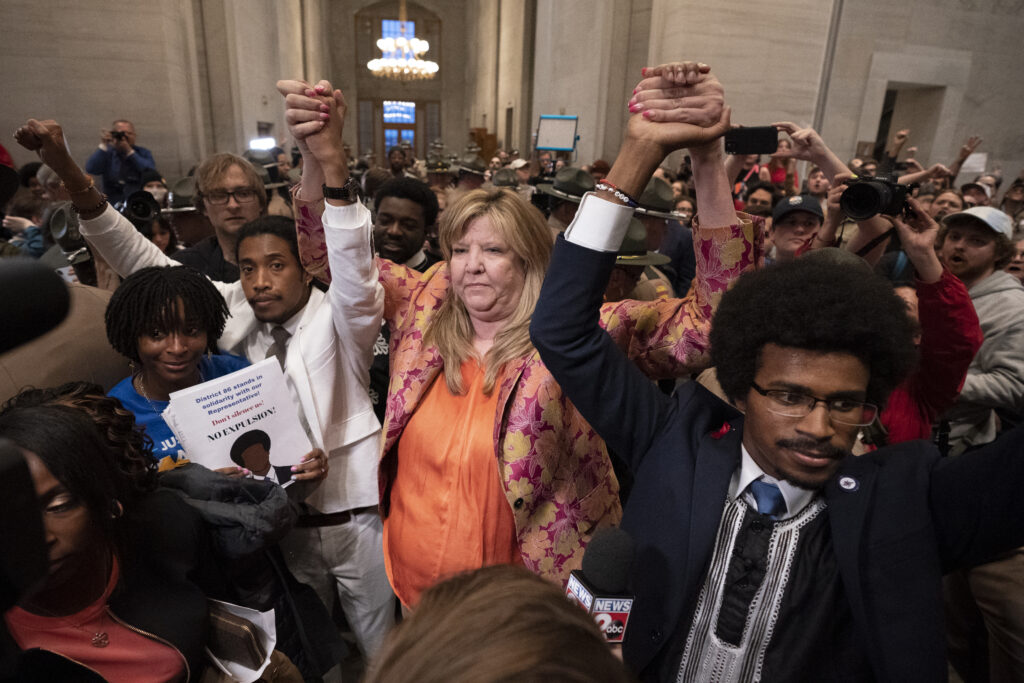Tennessee General Assembly Expels Two Black Lawmakers in Latest Attack on Democracy
WASHINGTON, D.C. — On Thursday, April 6, Tennessee Republicans expelled two state lawmakers who protested with voters at the capitol for gun safety legislation after a mass shooting at a Nashville elementary school in March left three children and three adults dead. The Tennessee General Assembly expelled Reps. Justin Jones and Justin Pearson, two young Black, Democratic lawmakers who represented parts of Nashville and Memphis, respectively.
The Assembly did not expel a third Democrat, Rep. Gloria Johnson, a white woman who represents parts of Knoxville, even though she protested alongside Jones and Pearson. When asked why she wasn’t expelled when the other lawmakers were, Johnson responded: “Well, I think it’s pretty clear. I’m a 60-year-old white woman and they are two young Black men.”
The three lawmakers’ protests temporarily halted proceedings in the Assembly as Tennessee’s Republican supermajority refused to consider gun reforms. GOP leadership claimed that the lawmakers, nicknamed the “Tennessee Three,” broke Assembly rules by “knowingly and intentionally bring[ing] disorder and dishonor” to the capitol and put forth expulsion motions in retaliation.
Only one Republican lawmaker voted against the expulsion of all three Democrats: Rep. Charlie Baum of Murfreesboro.

The expulsions are just the latest anti-democratic act by legislators that have drawn gerrymandered maps, passed legislation to limit local power in Nashville and refuse to fix voter suppression laws.
Earlier this week, a panel of Tennessee judges heard challenges to a new state law that requires Nashville to cut its city council in half. The law mandates that city and metro councils have no more than 20 members (Nashville’s council has 40). Voters and officials said the law is an “unprecedented disenfranchisement of the voters of Metro Nashville” as it only requires Nashville to cut its council and no other city is affected.
Initially formed in 1962 by voters, Nashville’s current 40 council members represent the diversity of the city as “a quarter of the council’s seats are held by Black members, half are held by women and five identify as LGBTQ.” Opponents of the law say it was passed in response to the council’s refusal to host the 2024 Republican National Convention in Music City.
Beyond stripping Nashville of its local power, Republicans have also squashed the voices of voters statewide with aggressive gerrymandering, prompting voters to bring litigation over Tennessee’s state House and Senate maps in February 2022. They argue that Republicans violated the state constitution and created districts “to ensure maximum partisan advantage for the incumbent Republican supermajority.” Litigation over these maps is ongoing before a state trial court.
GOP lawmakers also “cracked” (meaning split up) Democratic voters in the latest congressional map. A clear partisan decision was made to split Davidson County, home to Nashville, into three separate congressional districts and group sections of the city with more rural, reliably Republican areas. Former U.S. Rep. Jim Cooper (D) represented Nashville in Congress for 20 years but did not seek re-election in 2022 because Republican lawmakers’ gerrymandering of Nashville eliminated his Democratic-leaning seat.
Most nefariously, Tennessee has one of the highest felony disenfranchisement rates in the country. A lawsuit is currently challenging part of the state’s felony disenfranchisement law, alleging it violates the state constitution. Nearly 9.3% of Tennessee’s voting age population cannot vote due to a past felony conviction, amounting to over 470,000 Tenneseeans excluded from democracy. Legislation could return voting access to these individuals locked out of democracy.
The plaintiffs in the case claim that “of the estimated disenfranchised population in Tennessee, nearly 174,000 are Black, accounting for more than 21% of the Black voting age population – likely the highest rate of Black disenfranchisement in the United States.” The Tennessee Supreme Court heard the case in October 2022 and has not yet released a decision.
Jones and Pearson’s seats are now vacant, but local officials can appoint replacements to fill the vacancies until special elections are called. Nashville Mayor John Cooper (D) tweeted Thursday night that the Nashville Metro Council is meeting on Monday to fill Jones’ seat and he believes “they’ll send [Jones] right back to serving his constituents.”
The chair of the Shelby County Commission, which will appoint an interim representative for Pearson’s seat, said that the commission would consider reappointing Pearson. The Shelby County Commission has a Democratic supermajority.
The actions in Tennessee exemplify Republicans’ continued attacks on the democratic process and voting rights. After his expulsion, Jones gave a speech outside the state capitol saying that “We said, ‘we want to ban assault weapons;’ [Republicans] said, ‘we’re going to assault democracy.’”
Learn more about the efforts to undermine democracy in Nashville here.